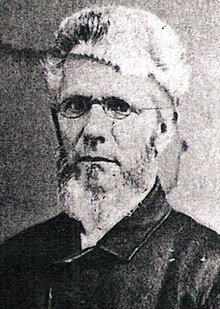The Danner Family
After the Civil War, Danner continued to be an integral part of Gettysburg society. He served as a Director for the Battlefield Memorial Association that was formed in 1864. He also served on the emergency recruiting committee and the local committee for the Sanitary Commission's Great Central Fair. Danner also served as Treasurer for a term at the Good Samaritan Lodge, number 336. Joel Danner passed away on July 29th, 1885. It has been documented in stories about the Danners that their home was always full of people; they rarely spent a night alone. Joel and his wife, Mary Juliet Buchanan, had raised seven children and the house remained in the family as it was passed from child to child. Their oldest child Henry, born in 1829, purchased the home from his father in 1875. Henry ran a small men's and boys' clothing store out of the home. In 1894—a year before he died—Henry transferred the house to his sister, Sarah Danner Hay. Sarah, born in 1837, had married a lawyer in 1865 and lived with him in York until he passed in 1883. She then moved back into her parents' house. The house that Sarah sold in York eventually became the York YWCA. Sarah died in 1908 and willed the property to her sisters, Annie and Eveline (Eva).
Eva, born in 1842, showed an early talent for music and trained at numerous schools of music. She was a music teacher in Gettysburg and the organist at the Reformed Church for over fifty years. Eva passed away on December 31st, 1910. Annie, born in 1833, cared for and lived in the home all her life. She was a teacher in the infant room at the Reformed Church for over fifty years. She even received a medal for her work as a Sunday School Teacher. Annie also dedicated much of her time to girls who worked to make a living. The Annie Danner Club of Industrial Girls was created in her honor. When Annie died on February 25th, 1920, the property and all its belongings (quite a collection as it included the property of the entire Danner line) were willed to the youngest Danner, Irene. Also known as Mrs. Charles Reinewald, Irene was born in 1852. She married Reverend Reinewald in 1890. When he passed in 1920, Irene moved back to her homestead on Lincoln Square.
In 1923, Irene wrote in her Last Will and Testament:
I devise and bequeath my house on Center Square, Gettysburg Borough, Adams County, Pa., and all the contents thereof to my hereinafter named executor, Irvin L. Taylor, in trust for a home for a Young Women's Christian Association of Gettysburg, PA. I give and bequeath the proceeds from the sale of all the rest, residue, and remainder of my estate to Irvin L. Taylor, in trust nevertheless to safely invest the same and to use the net annual income arising therefrom for the support and maintenance of the said home. Prior to this, there was not a YWCA in Gettysburg. According to a newspaper account, there was a group of girls called the Acorn Club. The Club was dedicated to helping in any local charity work. On the return trip from a short vacation, the Acorn Club stayed at a YWCA. Impressed by the "Y," the girls tried to start an association in Gettysburg. They called for a representative of the Young Women's Christian Association to come to visit with them. Irene was interested in the idea of a Gettysburg YWCA branch and asked to meet with the representative as well. They found that a new building for the group would be too expensive, so instead, they took to meeting in their homes, taking a turn at each house. Some of these meetings were held in the Danner House. When Irene passed away on May 28th, 1925, she provided Gettysburg with a YWCA that became an integral part of the town. The only two Danners who did not hold main ownership of the house were Joel Albertus Danner who died in 1904, and Hannah Margaret Danner who moved to Frederick with her husband Melville E. Doll and remained there until her death in 1914.
